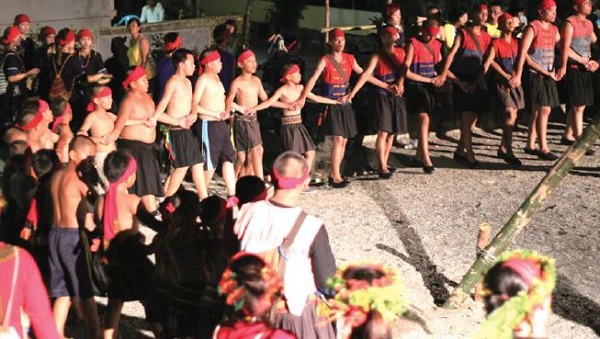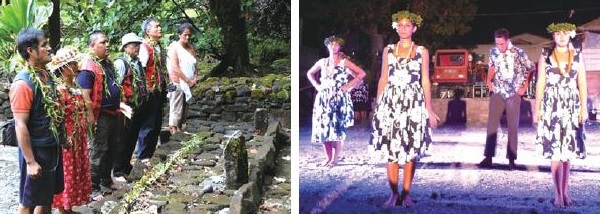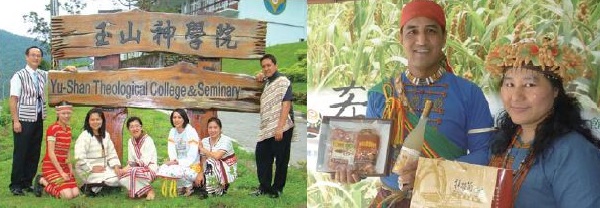【Taiwan】Break off the shackles and create a new situation
——Challenges and new opportunities for Taiwan’s aboriginal churches
Text/Sakinu.Tepiq (Chinese name Dai Mingxiong)

▲The Paiwan people’s “Millet Harvest Festival” is a grand event. This is also the way Xinxianglan Church worships God at Sunday gatherings. They retain the form of traditional culture, but use it to worship the true God!
Preface
Among Taiwan's aborigines, a high proportion of Christians are present, and churches also play a pivotal role in aboriginal settlements. With the changes in society and the awakening of aboriginal self-identity, aboriginal rights have been taken seriously, and aboriginal churches have also seized new opportunities. This is exciting. People of insight should be vigilant, help and encourage each other, and lead Taiwan's aborigines to completely break free. Shackles and create a bright new situation.
The definition of self-identity has always been a major issue faced by Taiwan's indigenous people. The concept that "the aboriginal people are the original masters of Taiwan" is now generally accepted, and even the big statement that "the Austronesian people are derived from the aboriginal people of Taiwan" is often mentioned in academic circles. Since the end of World War II and the Nationalist Government moved to Taiwan, they have been indoctrinated with ideas such as "I am a mountaineer" or even "I am a Chinese" due to political considerations. Although there are still a few aborigines affected, with the surge of self-consciousness movements, most of them have The indigenous people have all awakened.
The dawn of indigenous independent development
Because Aboriginal people are a minority in society, they have often been ignored and ignored in the past. Fortunately, after the democratization of society, the aborigines are very good at speaking out for themselves and know how to "survive in the cracks." Eventually, the aborigines are gradually seen by mainstream society.
The first political party rotation in 2000 brought indigenous issues to the forefront. During the election campaign, the political ideas promised to indigenous groups - "a new partnership between the Taiwan government and indigenous peoples", such as: indigenous autonomy, investigation of traditional areas, The formulation, promulgation and implementation of the Basic Law of Indigenous Peoples have highlighted the status of indigenous peoples and the importance of indigenous peoples in Taiwan's history, and used political power to protect and respect the rights and interests of indigenous peoples.
When the government changed again in 2008, the governance of the indigenous people could no longer be as rough and arrogant as in the past. For example: regarding the issue of nuclear waste, the Tawu people of Orchid Island were treated with deception and discrimination in the past. But now, in order to find the final and permanent storage site for nuclear waste, Taitung Daren, Jinfeng, Pingtung Mudan, Kinmen Wuqiu, Penghu Wan'an and other places (the first three are all aboriginal settlements). Among them, Daren’s Nantian is the most popular candidate site. However, although the government does not dare to force a final decision, it has actively lobbied and won over local gentry and tribal opinion leaders to visit nuclear waste disposal sites in other countries, and then deceived them (propaganda The "absolute safety" of nuclear energy and nuclear waste) and inducements (5 billion Taiwan dollars in rebates) induce the tribesmen to agree to place the nuclear waste in their original hometown. This move caused a stalemate between the pros and cons of the tribe, and the emotions of each other were torn apart! For this 5 billion in rebates, the people who have been relatively poor for a long time are not thinking about caring for the land or strengthening cultural inheritance, but how to move out of this remote rural area and move their families to urban areas. "What about cultural heritage and land sentiment? As long as my household registration is still in my original place of residence, I can receive regular feedback every year!" How many people face the issue of nuclear waste with this ostrich mentality, regardless of their homeland or tribe For the sustainable development of China, such "spiritual harm" is truly worrying.
Building a road for Aboriginal ministry, the church takes the lead
The above is just the tip of the iceberg of aboriginal social problems. There are still many problems that arise from the pull and restraint of mainstream consciousness and values, such as the holding of traditional rituals and the performance of hunting behavior, or even education, politics, economy, etc. Everyone is trying to adjust, but in the end, we lose our "original" flavor and blindly learn from others, denying what we originally had and knew, causing the next generation to become increasingly distant from their own tribe and culture. the further away. Of course, there are political factors, as well as factors such as foreign religions. No matter what, the problem lies in the fact that Aboriginal people have lost the ability to "affirm themselves" and always feel that others are better than me, ignoring that their own goodness can actually be appreciated by others.
First, of course, is the identity of "Taiwan is the homeland of the Austronesian people."
Driven by a sense of responsibility and mission, many indigenous groups and tribes, especially churches, began to lead their people to regain their long-lost self-confidence and pride. This is a very arduous task. If you don't do it, you can only wait for your own ethnic group to perish and disappear. If you work hard, you can hope to continue our culture. In fact, you are preserving this "world treasure" for Taiwan. Reconstruct the value and status of Taiwan’s aboriginal groups.
In recent years, the government has gradually understood the importance of indigenous peoples in Taiwan and other countries around the world, and is working hard to implement various plans. Whether it is in terms of mother tongue, tribal industries, ethnic education, etc., it hopes to help tribes themselves promote some development plans. They even make good use of church resources, such as opening youth cultural development classes, day care centers for the elderly, child care, etc. The government highly recognizes the church's long-term spiritual care and life care for the tribes, and is the government's most powerful partner in promoting various projects. , so there are currently many churches that undertake government-related projects and implement them in tribes.

▲ (Left) Tahitian residents believe that Taiwan is their birthplace. In 2012, the pastor went to Tahiti for cultural exchanges, and the guests received hospitality.
▲ (right) Later, the Austronesian ethnic groups in Tahiti also came to the New Pandan Church for cultural exchanges and offered their dances to bring blessings.
Yushan Theological Seminary and Taiwanese Aboriginals
If we look at the missionary history of the Presbyterian Church in Taiwan, it has been nearly 150 years since the gospel entered Taiwan, and nearly 70 to 80 years since it entered the aboriginal tribes. The missionary work in aboriginal areas has achieved very good results, creating "Missionary in the 20th Century". Miracle", many tribes and entire villages believed in Christ. According to statistics from 1970, Christians accounted for more than 80% of the aboriginal population, and tribal churches were established one after another in various places.
In view of the large harvest field and few workers, in 1946, the "Yushan Theological Seminary" was founded to specialize in training aboriginal clergy, the "Nanny School" to train life skills and spiritual development, and the "Nanny School" to train men in professional skills. Volunteer School".
The establishment of Yushan Theological Seminary had a profound impact on aboriginal society. Over the past sixty-seven years, it has cultivated many elites for aboriginal tribes across Taiwan. Pastors trained by Yushan Theological Seminary not only preach God’s salvation, but also lead people to turn to God and trust God. The most important thing is to accompany the growth of the tribe and share the mission of caring for and developing tribal projects and spiritual growth with believers. .
In the 1980s, Taiwanese society became more democratic, and some young intellectuals from aboriginal communities began to form aboriginal associations in universities to call for the awakening consciousness of the aboriginal people. Among them, Yushan Theological Seminary attracted more attention. Through biblical teachings, faith reflection, and theological interpretation of various plights in Aboriginal society, teachers and students in the school are encouraged to pay attention to the many unfair events that occur in Aboriginal society. For example: the Nantou Dongpu grave digging incident, the Wu Feng incident, the street movements such as Return Our Land. Yushan Theological Seminary has never been absent, and it also gave those of us who were studying at that time a profound learning experience outside the school walls.
After graduating, the author immediately started serving in the tribal church. From the pastoral meeting, he observed the decline of the tribe. On the surface, it was peaceful, but there were many crises hidden inside. Whether it was language, traditional culture, history, or even thinking, it was almost completely disintegrated. If it were not for the church's promotion and active preservation of the mother tongues of all ethnic groups (translation of Bibles and hymns in each ethnic group's languages), the indigenous languages would most likely disappear like the Pingpu people's. If the church had not focused on the training of local clergy, cultivating many pastors of various ethnic groups who use their own mother tongues to preach and care for the tribes, Taiwan's aboriginal culture may have become an empty shell without soul and interior.

▲ (Left) Over the years, Yushan Theological Seminary has spared no effort in cultivating pastors of all ethnic groups who pastor in their mother tongue and assist in tribal reconstruction.
▲ (right) Pastor Dai Mingxiong and Mrs. Gao Lixiang worked together in church pastoral care and tribal reconstruction, giving beautiful testimony.
Image source: http://www.ipact.atipc.org/Industry_detail/154
Let the Church Be the Watcher of the Tribe
Nowadays, the role and function of the church in tribes are becoming more and more diverse. It is no longer the cohesive approach of the era of singing "Come to Jesus", but the outreach of going into tribes to tell tribesmen that "Jesus is our hope" action. That is to tell them: "Jesus is the Lord of all aboriginal people, whether it is life, culture, spiritual life, etc., Jesus is our Lord." Therefore, many churches make good use of social resources to create gospel ministries, indirectly or directly Ways to integrate the gospel into tribal development. What is revealed from these practical actions is to tell Aboriginal believers: "Jesus' reign as king is not limited to the church, but also in our tribe." The key point is to let the tribesmen see the church's actual participation in tribal life. , so that they can see God’s love and receive God’s blessings.
The church should make good use of the tribe's advantages to accompany the development of the tribe. It cannot stay outside the tribe and only focus on living a faith life of "feeling good about itself" and singing "Hallelujah". This is very unwitnessed. In addition to being good stewards and managing for God the tribe He has promised to bless, we must also be watchers, relying on God’s power and authority to watch over the people, things, places, things, and most importantly, the spirit of the tribe! Be a competent prophet, use foresight and foresight to discover the needs of the tribe, see God’s different visions in each tribe, pray urgently, do the Lord’s work diligently, and glorify God and benefit people. This is our heartfelt prayer.
Further reading
1. Don’t let the harvest festival become a crazy year festival—Pastor Dai Mingxiong talks about the experience of developing tribal industries, written by Ke Yaxuan, see: http://www.88news.org/?p=14887
2. Recovering the Paiwan tradition - Dai Mingxiong carries on the past and opens up the future, interviewed by reporter Jenny Wu, see:
http://enews.ccu.edu.tw/modules/news/article.php?storyid=4922
3. Want children, not nuclear weapons—more than 2,000 people marched in Taitung, interviewed by Chen Ruizhe,See here.
Click to read more articles about caring for indigenous people around the world.

The Paiwan name is Sakinu.tepiq (Sainu · Debiege, Chinese name Dai Mingxiong). He grew up in an aboriginal tribe, and his study career has always been inseparable from the living area of the aboriginal people. When he was serving in the military, his unit had 80 % is an Aboriginal. Studying at Yushan Seminary was a turning point for him to get rid of his inferiority complex as an Aboriginal and regain his confidence.
He is currently the pastor of New Xianglan Church, Taiwan Presbyterian Church, and a part-time lecturer at National Dong Hwa University. In addition to engaging in clergy and teaching positions, he also implements the government's "Key Tribal Projects", "Aboriginal Family and Women's Service Center", "Day Care Center for the Elderly", "Safe Community Project", and "Labor Commission" in the tribes. "Multiple Employment Program-Economic Type", the Health Bureau's "Betel Nut-Free Community Project", etc.
Education: Department of Dogmatics, School of Theology, Fu Jen Catholic University, Department of Theology, Yushan Theological Seminary, PhD in Pastoral Studies, Tainan Theological Seminary.
Experience: Paiwan language certification examination committee member, textbook editor committee member, and review committee member. Implement post-Morakot disaster-related reconstruction plans (life, industry, spirituality, etc.). He is currently the chairman of the Native Tribe Reconstruction Cultural and Educational Foundation, a legal person, and the chairman of the Xianglan Community Development Association of Taimali Township, Taitung County.
